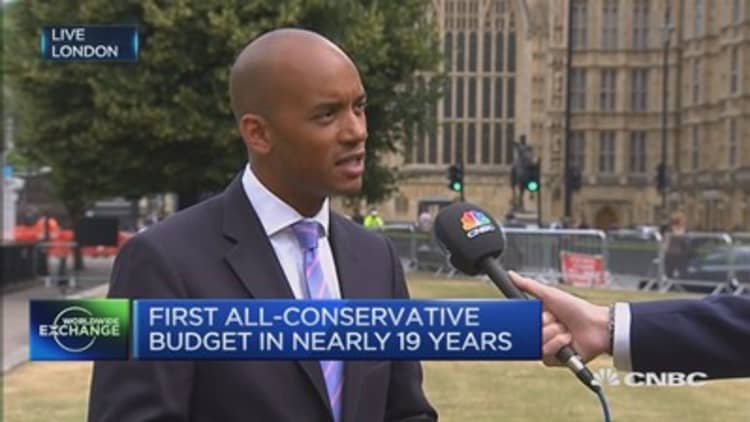U.K. finance minister George Osborne on Wednesday announced a range of stringent cuts to the country's welfare system, as well scrapping the levy on banks and making deep cuts to corporation tax.
Speaking in his "Summer Budget"—the first since the Conservative party came to power in a general election in May—Osborne introduced deep cuts to the country's benefit system.
"Britain still spends too much, borrows too much. You only have to look at the crisis unfolding in Greece as I speak, to realize that if a country's not in control of its borrowing, the borrowing takes control of the country," Osborne said.
He also pledged to tackle tax evasion, ease the tax burden on workers, and lift the threshold on the 40-percent tax bracket.
Osborne also cut corporation tax from 20 percent to 19 percent in 2017 and 18 percent by 2020, claiming that the measures send out the message that the U.K. is "open for business".
Read MoreUK GDP revised up as disposable income jumps
His words meant with a broadly positive response from the Institute of Directors (Iod), a U.K. business lobbying group.
"In today's Budget, George Osborne has offered business a new deal on employment," IoD Director-General Simon Walker said in a news release after Osborne spoke.
"Introducing a national living wage at a significantly higher level than the minimum wage was a dramatic announcement, but in return, companies have been provided with a cut to corporation tax and an increase in the employment allowance. We should not understate the boldness of this move, and many businesses will have been taken by surprise, but we accept that after several years of slow wage rises, now is the time for companies to increase pay," Walker added.
The tax-free personal allowance will be hiked to £11,000 ($16,900) next year from £10,600 and the threshold for taxpayers on the higher 40 percent tax rate will be lifted from £42,385 in this tax year to £43,000 in 2016-17—on its way to the £50,000 target.
This measure will mean that around 29 million people will pay less tax, Osborne said.
The country's welfare bill should be cut by £12 billion, mainly taken from tax credits, housing benefits and a lower cap on welfare as well as introducing a "national living wage" of £9 an hour by 2020.
Plus, young people aged 18-21 years will no longer be automatically entitled to housing benefit, which, along with other reforms, is set to save the country £9 billion.
"Those who can work will be expected to work and take it when it is offered," Osborne said on Wednesday,
Corporation tax cut
The controversial permanent non-domicile tax status was scrapped, with Osborne saying: "Anyone resident in the U.K. for more than 15 years of the past 20 years will now pay full British taxes on all worldwide income and gains."
U.K. growth forecasts were revised down marginally by the Office for Budget Responsibility, with forecasts showing 2015 GDP growth of 2.4 percent, down from March's forecast of 2.5 percent.
Read MoreUK election: Now what? Scottish surge and 'Brexit'
He also introduced a 8 percent surcharge on bank profits from the start of 2016, which will replace the levy imposed on banks.
The Chancellor said the bank levy was initially introduced to raise revenue and increase stability, however now it risks doing harm unless it is changed. The new bank surcharge - likely to be based on 8 percent of what they currently pay in corporation tax - would raise more than the bank levy currently collected, he said, and will be introduced from January 2016.
HSBC, the biggest payer of the bank levy, have been its fiercest opponent and had threatened to move their headquarters out of the U.K. if it was not scrapped.
The Budget is the first fully Conservative economic plan in nearly 20 years, as the party is now unencumbered by a coalition partner after winning the general election out-right in May.
Sterling fell against the dollar ahead of the Budget, dipping 0.5 percent to fall below $1.54 for the first time since the start of last month.It traded around $1.53 shortly afterwards.
London's FTSE 100 extended gains after the announcement, trading up 1 percent with financials and mining stocks leading the way.

The U.K.'s economic recovery appears entrenched, with nine quarters of consecutive growth, although there are fears that wage growth and productivity is lagging.
Chuka Umunna, shadow business secretary in the opposition Labour party, told CNBC on Wednesday that Osborne needed to address "structural imbalances in the economy."
Read MoreUK economic growth revised up, household real incomes
"We have the lowest rate of productivity in the Group of Seven (G-7) nations, save for Japan, and if you look at the way our economy is shaped there's not enough savings," he said.
"We still have the really big ongoing issue about our current account deficit and we don't see even growth across our economy – we need to see a greater variety of sectors contributing to our growth."
The current account deficit – when the value of services and goods the U.K. exports is lower that the value of those that it imports – rose to average 5.5 percent of GDP in 2014 – the highest level for 60 years.



